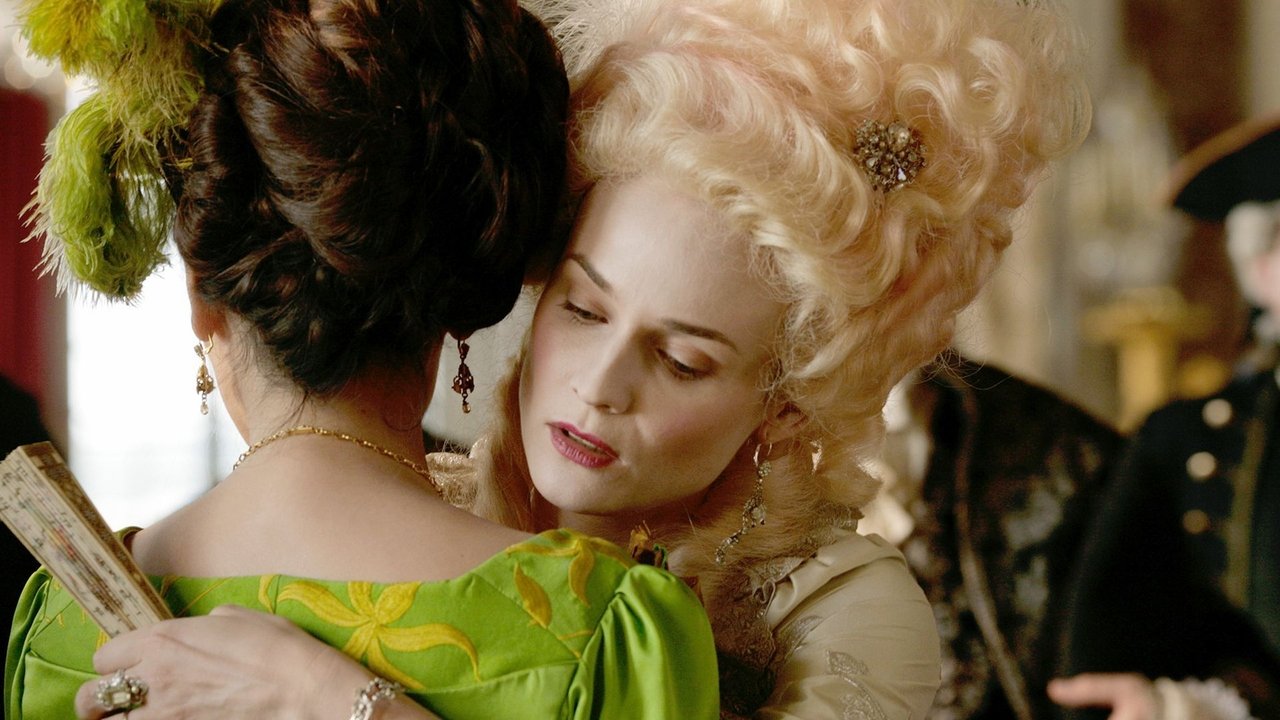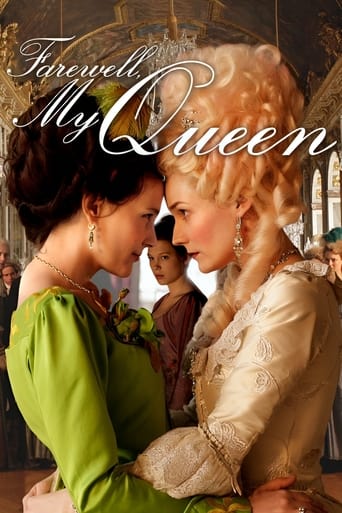

French screenwriter and director Benoït Jacquot's twentieth feature film which he wrote with French screenwriter and author Gilles Taurand, is an adaptation of an eponymous novel from 2002 by French author Chantal Thomas. It premiered In competition at the 62nd Berlin International Film Festival in 2012, was shot on locations in France and is a France-Spain co-production which was produced by producers Jean-Pierre Guérin, Kristina Larsen and Pedro Uriol. It tells the story about a French servant and seamstress who lives in a room at the Palace of Versailles in France with a friend named Alice.Distinctly and precisely directed by French filmmaker Benoït Jacquot, this quietly paced fictional tale which is narrated by and mostly from the main character's point of view, draws a gripping portrayal of a person who before the establishment of the French National Assembly, the March on Versailles, a speech by a French attorney named Maxmilien François Marie Isidore de Robespierre (1758-1794) where he articulated a transcending motto which may have appeased the ingrained and unwavering advocates of total equality by adding a word which in all fairness is just as significant and during the beginning of the French Revolution (1789-1799) and the Great Fear when an announcement regarding citizens of the then Kingdom of France (843-1792) who were to be guillotined for the sake of a reform was announced, aspires to serve a Queen of Austrian origins named Marie-Antoinette Joséphe Jeanne de Habsbourg-Lorraine (1755-1793). While notable for its atmospheric milieu depictions, majestically cinematic cinematography by cinematographer Romain Winding, production design by production designer Katia Wyszkop and costume design by costume designer Christian Gasc, this character-driven and dialog-driven story about famine, monarchy, social insurrection and a pivotal time in French history when present political ideologies were being developed and where a royal daughter, sister, wife and mother who did not chose to be a royalist is imprisoned by her passions and a person who isn't of the aristocracy plays on her mistress' passion, using herself as an instrument, to gain her objective, depicts an enigmatic study of character and contains a great and timely score by composer Bruno Coulais.This historic and understatedly romantic silent dance of glances within interior surroundings which is set in the late 18th century in France during the reign of King Louis-Auguste XVI (1754-1793) and where a reader understands whom she has to reach to get to where she is headed, is impelled and reinforced by its cogent narrative structure, subtle character development, rhythmic continuity, comment by Marie-Antoinette: "Have you ever been attracted ?" and the reverent acting performances by French actress Léa Seydoux, German actress Diane Krüger and French actress Julie-Marie Parmentier. A virtuously cinematographic and densely literary narrative feature.
... View MoreIn film alone there have been eight representations depicting the life and times of Marie Antoinette. Benoit Jacquot's latest interpretation comes from a screenplay that he and Gilles Taurant adapted from Chantal Thomas's novel. Filmed largely at Versailles it looks closely at the class divide between monarch and servant and how blind love can distort your view. It's told from the point of view of a servant blindly committed to her Queen. Visually sumptuous with a compelling narrative it skilfully avoids the dullness of many period dramas.The story takes place during the last four days leading up to the French Revolution. Culminating in the overthrow of the monarchy and the execution of the King and Queen of France. A young woman Sidonie (Lea Seydoux) is the official reader to the Queen. She is Marie Antoinette's (Diane Kruger) number one fan. Scratching away at mosquito bites and grimacing at the site of a giant rat lurking in the servant's quarters she chooses to ignore all the rumblings and gossip of rebellion and dissent emerging around her. She is an unapologetic servant of the beautiful seductive Queen. Having shared a coffee she observes "It's all going wonderfully well." Marie Antoinette spends most of her time draped in fine clothes and surrounded by gold in her private chambers. She vaguely peruses the latest fashion magazine. She requests embroidery and books, self-absorbed, vain and removed from the realities of poverty and deprivation outside her Palace walls. Running and stumbling and always late Sidonie serves at the behest of her Queen. "So young and already so blind" comments the wise old historian Morcau (Michael Robin). As the days pass the hallways and corridors become crowded with panicked servants and gentry alike. A list of names to be beheaded emerges causing terror amongst the Bourgeoisie. The final hours of a corrupt monarchy reveal a Queen who will sacrifice anyone for the love of her dearest Mme de Polinac (Virgine Ledoyen). Throughout the proceeding Jacquot gives the film a contemporary feel, using a constantly moving camera that follows Sidonie wherever she goes. No conventional traditional set-ups, the fluidity of the camera-work gives the film a sense of urgency. Benoit loves a tracking shot. The Production Design by Katla Wyszkop (Potiche) is worth the price of admission contrasting the emptiness of the maid's quarters, against the opulence of Marie Antoinette's private quarters. Cinematography and lighting by Romain Winding is exquisite. It's as if he's lighting by candle for much of the picture. The performers are all excellent, Kruger captures the seductiveness of the Queen, but it's Seydoux in almost every seen who transfixes with her sublime performance.
... View MoreI enjoyed this movie specifically because it dealt with the first few days (only) of the French Revolution -- no need to watch people being beheaded. I thought is was a realistic and interesting portrayal of Marie Antoinette because it didn't attempt to make her sympathetic or to cast her as a misunderstood, crypto-feminist. Too many books these days attempt to do that where, lets face it, she was eating cake while millions starved. The French monarchs got exactly what they deserved.I enjoyed this move because I could follow the dialog since it was with subtitled. I don't know why it is, but all movies involving the French aristocracy in the 18th century has the characters chattering at a rapid rate. This must be because pictures from that period make you think that's how someone dressed up like that would talk. But I am sure that lots of people in those days spoke slowly and deliberately. Further, I don't understand why the latest fad in movie scripts is unintelligible dialog mumbled. At any rate, these characters spoke in the usual staccato, but since there were subtitles I got every word.There is a lot of dramatic tension in this film because of the angst of the characters left in the dark as the Old Regime crumbles. If you know anything about the period, you know what the main characters will do, but for the rest ... who knows? People who have criticized this film for not providing background or context should consider that this is a French movie aimed at French people. I don't think we would need much context if a movie started out with people in colonial garb and a big sign that said, "This way to Bunker Hill." Now to the spoiler, and my puzzlement leaving the movie. At the end, the heroine is dressed up as a noble woman (who is the lesbian lover of Marie Antoinette) and the noble woman is dressed as the servant. The idea is that they will take a carriage to escape France, and if they are stopped the servant-heroine will die. The carriage is stopped, and after a long minute of having her papers examined our heroine is motioned to go on to safety.No one has commented on this, but I'm wondering: the officer who examines the papers must know who she is. He must be someone who we have seen earlier in the film at Versailles. It would make no sense any other way since she is dressed up as public enemy #1 and there is an angry crowd in the background. Who was the soldier? One of the problems with this movie is that it is hard to keep track of who's who, and it is a directing mistake (assuming I'm correct) to fail to make us aware of the identity of the soldier. (Were I the director, I would solve this by dressing him in WWII uniform, but I guess that's why I'm not a director.)Next spoiler. Other viewers have focused on the lesbian relationship, and they question the authenticity of our heroine being so devoted to the Queen who is a self-absorbed airhead. My question: when the queen tells the heroine about her great love, you get the distinct impression that the heroine believes Marie Antoinette is about to name her. Earlier in the film, we see the queen essentially fondling her. Is our heroine supposed to be a closet lesbian? If so, this explains why she is so devoted to the queen and also why she agrees to put on the dress that makes her a target for the mob.
... View MoreThis film is a wonderful study of what the last days of the French royalty in Versailles, particularly of the way, Marie Antoinette behaved and delivered her commands. It is all seen through the eyes of her reader, a very interesting character. She is the queen's personal reader, someone who has been bewitched by the Queen's strong charm. There are rumours in the palace, and very few people can validate them. Whether it is from loyalty, admiration, or fear, secrets are guarded and some dubious qualities admired, maybe misunderstood. It is hard to believe Sidoine can't see the true nature of the queen. Maybe it is because she might be infatuated with her, or maybe because the way Antoinette is played by Diane Kruger, there is very little choice but to be in awe of her.Kruger is a beautiful woman, and she can play mystical characters very well. One could believe kingdoms were fighting for her Helen in "Troy", and in "Farewell", it is likely she probably wielded and manipulated her court more effectively than her husband did. There is still room in her performance to show that she still felt limited and bound by some conventions, but it was clear she was a powerful woman.Her scenes with Sidoine are full of tension, making us wonder what is going behind each woman's facade. We never really know because all we see is very controlled reactions, emotions, furtive glances, light brushes, hints at deeper and more forbidden forces.Sidoine knows how to find information, and she struggles because it might not be a good idea to know too much. It haunts you. She is in the most inner circle of the palace, and she might see and know too much, but she fails to make good use of what she knows. In fact, like Antoinette, she might be restricted by her social place and gender, and it's that inability to overstep her boundaries that might surprise people in the final scenes of the movie, as we are floored by Antoninette's request and Sidoine's reaction.The film is gorgeously produced, scored, and photographed. There is something about the way that period in French history looked like. It complements the decadence of the upper classes. We know such opulence is not cheap, and we can see in the disdain shown to the lower classes, that there will be consequences for all involved. It is an elegant and intelligent film, full of layers that are shown are effectively displayed. Much is done with the presentation of a costume, a reference to a special dish, how culture is appreciated and used as a weapon here. Antoinette knows her place, and she uses it grandly, as we can see by Kruger's performance. Power is intoxicating and binding, and it can lead to very dangerous resolutions, but this will not beat the power of the human heart, and that's the essence of this queen's maneuvers.
... View More